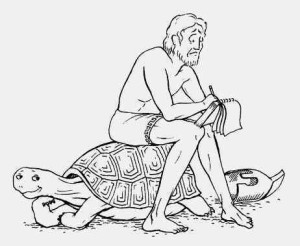ACHILLES AND THE TORTOISE 7th Revision
An Essay on the Logical Foundations of Torah Study;
SELF EVIDENCE, INTUITION, AND THE SEARCH FOR TRUTH
by Gerald Parkoff
This essay deals with the very foundations of Rule Following Systems and what underlies all legal and ethical systems of evaluation. The analysis is extended to Torah Law. The psychological process of intuition is discussed together with the very limits of human reasoning and evaluation.
To begin with, let us eaves drop on Achilles conversation with the Tortoise, his nemesis in plain logic and sense/
Achilles had overtaken the Tortoise, and had seated himself comfortably on its back.
“So you’ve got to the end of our race-course?” said the Tortoise. “Even though it does consist of an infinite series of distances? I thought some wiseacre’ or other had proved that the thing couldn’t be done?”
“It can be done,” said Achilles. “It has been done! Solvitur ambulando. You see the distances were constantly diminishing: and so-“
“But if they had constantly been increasing?” the Tortoise interrupted.
“How then?”
“Then I shouldn’t be here,” Achilles modestly replied; “and you would have got several times round the world, by this time!”
“You flatter me – flatten, I mean,” said the Tortoise; “for you are a heavy weight, and no mistake! Well now, would you like to hear of a race-course, that most people fancy they can get to the end of in two or three steps, while it really consists of an infinite number of distances, each one longer that the previous one?”
“Very much indeed!” said the Grecian warrior, as he drew from his helmet (few Grecian warrior possessed pockets in those days) an enormous note-book and a pencil.
“Proceed! And speak slowly, please! Shorthand isn’t invented yet!”
“That beautiful First Theorem of Euclid!” the Tortoise murmured dreamily. “You admire Euclid?”
“Passionately! So far, at least, as one can admire a treatise that won’t be published for some centuries to come!”
“Well, now, let’s take a little bit of the argument in that First Theorem-just two steps, and the conclusion drawn from them. Kindly enter them in your note-book. And, in order to refer to them conveniently, let’s call them A, B, and Z:
(A) Things that are equal to the same are equal to each other.
(B) The two sides of this triangle are things that are equal to the same.
(Z) The two sides of this triangle are equal to each other.
“Readers of Euclid will grant, I suppose, that Z follows logically from A and B, so that anyone who accepts A and B as true, must accept Z as true?”
“Undoubtedly! The youngest child in a high school-as soon as high schools are
“And if some reader had not yet accepted A and B as true, he might still accept the sequence as a valid one, I suppose?”
“No doubt such a reader might exist. He might say `I accept as true the hypothetical proposition that, if A and B be true, Z must be true; but I don’t accept A and B as true.’
Such a reader would do wisely in abandoning Euclid, and taking to football.”
“And might there not also be some reader who would say `I accept A and B as true, but I don’t accept the hypothetical’?”
“Certainly there might be. He, also, had better take to football.”
For the complete Essay, click on the PDF here:
PDF Achilles and the Tortoise, on Self Evidence 8th Revision with Footnotes

